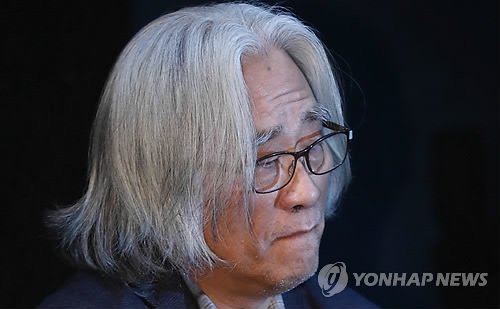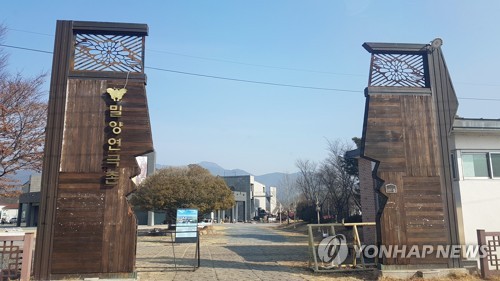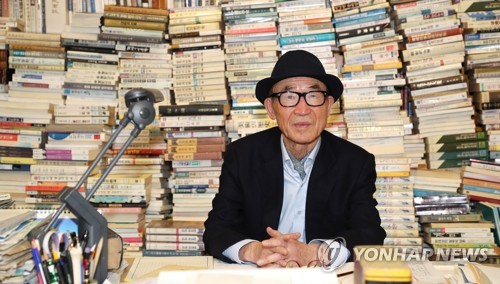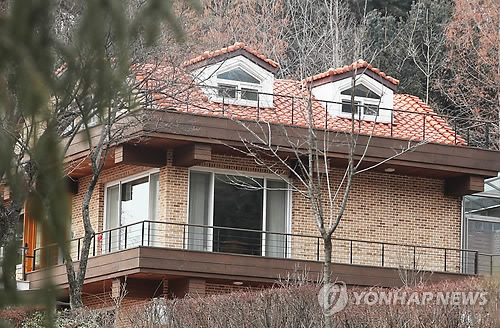- California Assembly OKs highest minimum wage in nation
- S. Korea unveils first graphic cigarette warnings
- US joins with South Korea, Japan in bid to deter North Korea
- LPGA golfer Chun In-gee finally back in action
- S. Korea won’t be top seed in final World Cup qualification round
- US men’s soccer misses 2nd straight Olympics
- US back on track in qualifying with 4-0 win over Guatemala
- High-intensity workout injuries spawn cottage industry
- CDC expands range of Zika mosquitoes into parts of Northeast
- Who knew? ‘The Walking Dead’ is helping families connect
‘#MeToo’ movement ripples through cultural circles
By Shim Sun-ah
SEOUL, Feb. 20 (Yonhap) — Lee Youn-taek is arguably the most influential playwright and director in Korea, credited with scores of critically acclaimed and commercially successful dramas on the stage and the big screen.
Ko Un is the most globally famous Korean poet, frequently mentioned as a Nobel prospect and often billed as Korea’s Tagore due to his poignant, powerful poems and lifelong devotion to democracy and human values.
The past two weeks have witnessed the fall from grace of these great artists in the wake of a flurry of allegations of long-hidden sexual abuses.
 Lee Youn-taek, a master theatrical director-writer, attends a press conference in Seoul on Feb. 19, 2018, to apologize to victims of his sexual misdeeds. (Yonhap)
Lee Youn-taek, a master theatrical director-writer, attends a press conference in Seoul on Feb. 19, 2018, to apologize to victims of his sexual misdeeds. (Yonhap)
Since a female prosecutor’s revelation last month that she was assaulted by a senior prosecutor several years ago, the “#MeToo” movement has rippled through diverse sectors of the deeply male-dominated Korean society.
The most recent and graphic revelations were made against the 66-year-old Lee last week.
Kim Su-hee, a theater group leader, said on Facebook that Lee sexually abused her about 10 years ago when she was an actress. On Saturday, a former actress, who asked to go by the alias of Kim Bo-ri, disclosed on an online community that she was raped by the prominent director in 2001 and again in 2002.
On Monday, Lee apologized to victims of his sexual misconduct spanning at least 18 years and vowed to leave the theatrical scene.
Lee was not the only one in theater circles who allegedly sexually assaulted actresses.
An unidentified actress said she was inappropriately touched by another stage director several times during dinners. Others said the director, who currently teaches acting at a university, even abused his students.
After her revelation of being raped by Lee, Kim Bo-ri also disclosed that another renowned artist who heads the Miryang Theatre Village, a complex of five play theaters and lodging facilities that can house 300 people, also raped her. Lee has been working as the director of the complex in Miryang, 386 kilometers southeast of Seoul, since 2014.
 A view of Miryang Theatre Village in Miryang, South Gyeongsang Province (Yonhap)
A view of Miryang Theatre Village in Miryang, South Gyeongsang Province (Yonhap)
“I sincerely apologize to the victims. I feel really ashamed of myself,” Lee said during a press conference in Seoul on Monday. “I’ll accept any punishment, including legal responsibility, for my sin.”
The Miryang city government gave notice that it will end a free land lease contract with the operator of the facility, which the operator accepted.
Lee, however, spawned criticism by denying the allegations of rape, saying he “did have a sexual relationship but not against her will.”
 A woman holds a banner reading, ‘Apologize to the party concerned, surrender to the police’ during a press conference for theatrical director Lee Youn-taek in Seoul on Feb. 19, 2018. (Yonhap)
A woman holds a banner reading, ‘Apologize to the party concerned, surrender to the police’ during a press conference for theatrical director Lee Youn-taek in Seoul on Feb. 19, 2018. (Yonhap)
“I think he doesn’t have any idea what sexual assault means,” Seol Yoo-jin, head of the Theater Company 907, said, emerging from the news conference. “Using mental pressure or his position within a group can constitute sexual violence. If sexual relations are established with no other option given, that’s rape, too.”
The issue is likely to spread further. The online public petition board run by the presidential office of Cheong Wa Dae has several filings calling for a criminal probe and punishment of the theatrical giant.
As of 11 a.m. Tuesday, there were over 40,000 names on one of the petition campaigns that began on Saturday.
On Sunday, Ko Un unveiled a plan to leave his home and writing studio, which were arranged by the Suwon city government at the foot of a mountain in the city located just south of Seoul, amid sexual assault allegations surrounding him.
Ko has been living there for the past five years since the city authority purchased and remodeled the house for him in an effort to encourage its development into a city of the humanities. The authority has since been paying electric utilities and water and sewage charges amounting to more than 10 million won (US$9,344) a year for the poet, who is regularly mentioned as a candidate for a Novel Prize for literature.
 This file photo shows the poet Ko Un. (Yonhap)
This file photo shows the poet Ko Un. (Yonhap)
He came under public criticism as he cited the Suwon citizens’ demand that he leave as a reason for his departure without any mention of the sexual abuse allegations.
His neighbors protested last year that it was unfair for the city government to support the poet when they have been financially suffering from a state measure designating the mountain area an environmental protection zone for nearly half a decade.
Earlier this month, Choi Young-mi released a poem titled “Monster” about a young female poet’s experience of being groped by a senior poet.
She said on Facebook that the poem is based on her own experience of being sexually assaulted by the senior poet. Although she did not disclose the name of the male character, the details described in the poem match up with Ko.
“When the time comes, I’m going to confirm the real name of the ‘senior poet’ in ‘Monster,’ and tell what exactly happened when he sexually assaulted me at a bar in Seoul’s Insadong and about the sexual violence (suffered by a married female editor) that I witnessed during a year-end party hosted by a publishing company on a day between 1993 and 1995,” she wrote.
She then called for the establishment of a pan-governmental organization tasked with investigating sexual assaults involving cultural-arts figures.
The posting is currently being shared on the Internet with support from over 1,500 people.
 A view of the poet Ko Un’s house in Suwon, Gyeonggi Province (Yonhap)
A view of the poet Ko Un’s house in Suwon, Gyeonggi Province (Yonhap)












![일본 사도광산 [서경덕 교수 제공. 재판매 및 DB 금지]](http://www.koreatimesus.com/wp-content/uploads/2024/07/PYH2024072610800050400_P4-copy-120x134.jpg)


